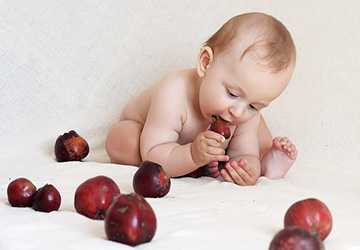Mastering Parenthood: An In-Depth Look at Your Child’s Developmental Journey
Are you worried your child isn't meeting all development milestones on time? Or are you curious about what to expect as your child grows and develops?
Are you worried your child isn't meeting all development milestones on time? Or are you curious about what to expect as your child grows and develops?
Every new parent thinks the same. Parents worldwide often ponder these questions, eager to understand their child's progress and ensure they are on the right track.
To answer all such queries of new parents, our parenting experts have carefully crafted this detailed guide on a child's developmental milestones!
As you delve into this post, you'll discover valuable insights into the milestones that matter most, helping you foster a strong bond with your child as they reach new heights.
But wait, there's more!

We'll also explore why you should take these milestones seriously and strategies to ensure your child grows and develops appropriately. And, for your convenience, we'll provide a detailed breakdown of age-specific milestones to serve as a roadmap for your child's growth.
Let's begin!
Types of Child's Developmental Milestones
As a parent, you're likely aware of the obvious physical milestones—your child holding their head up, mastering their grip, or sitting unassisted. But, there are additional dimensions of your child's growth that are equally important to observe.
Here are the four development milestones that your child must achieve;
1. Mastering Physical Skills
Physical milestones encompass both gross motor skills and fine motor skills. Gross motor skills, typically the first to emerge, include notable achievements like sitting, standing, crawling, and walking. On the other hand, motor skills involve more intricate movements like wielding a spoon, gripping a crayon, sketching shapes, or grasping tiny objects.
For instance, between the ages of 9 to 12 months, many children begin to stand independently or even attempt their first steps. However, the timeline for these skills can vary greatly—some children may start walking at nine months, while others may not take their first steps until they're 14 to 15 months or older. Remember, as long as these skills are eventually mastered, a delay within the expected range usually doesn't indicate future impairments.
2. Navigating Cognitive Milestones
Cognitive milestones revolve around a child's thinking, learning, and problem-solving ability. An infant reacting to facial expressions and a preschooler learning the alphabet are quintessential examples of cognitive milestones. Other instances may include searching for fallen objects or engaging in problem-solving activities.
3. Understanding Social and Emotional Milestones
Social and emotional milestones focus on children's developing ability to comprehend and manage their emotions and understand those of others. These milestones include learning how to interact with others, play cooperatively, and build empathy. Examples include showing a preference for primary caregivers, expressing emotions through facial expressions, and learning to self-soothe.
4. Deciphering Communication Milestones
Communication milestones comprise both verbal and nonverbal communication. From a one-year-old uttering their first words to a five-year-old grasping the basic grammar rules, these milestones are pivotal in a child's development. Other communication milestones include cooing or turning their attention toward a speaker.
Every child is unique and may reach different milestones at their own pace. These developmental milestones are just guidelines, not strict rules.
However, significant delays in reaching these milestones could indicate a potential developmental issue, and it's essential to consult a healthcare professional in such cases.
Growth Charts to Measure Physical Child Development
Growth charts serve as valuable tools in measuring and monitoring the physical development of children. These charts visually represent a child's height, weight, and other growth parameters over time.
Pediatricians can assess their growth trajectory by comparing a child's measurements to established norms and identify potential concerns.
Genetics, nutrition, and overall health influence a child's growth patterns, resulting in a wide range of shapes and sizes among children.
It is essential to understand that growth charts are not meant to define a child's worth or capabilities but to provide insights into their overall growth and ensure they progress along a healthy trajectory.
Every child is unique, and their growth journey should be respected and celebrated.
Development Milestones for Different Ages
Tracking your child's development is an exciting and essential part of parenthood. Each age brings forth a unique set of milestones that reflect their growth and progress in various areas.
Let's dive in and discover the incredible journey of childhood development!
Infancy (0-12 months)
Social/Emotional Milestones:
●Begins to smile and respond to familiar faces
●Develops attachment to primary caregivers
●Shows a range of emotions and expressions
Language/Communication Milestones:
●Cries to communicate needs
●Begins cooing and making vowel sounds
●Responds to sounds and voices
Cognitive Milestones:
●Explores objects through grasping and mouthing
●Recognizes familiar objects and people
●Begins to understand cause and effect
Movement/Physical Milestones:
●Lifts head and chest during tummy time
●Rolls over from tummy to back and vice versa
●Sits with support and later independently
●Reaches and grabs for objects

Toddlerhood (1-3 years)
Social/Emotional Milestones:
●Shows increased independence and assertiveness
●Engages in parallel play alongside other children
●Develops a basic understanding of emotions
Language/Communication Milestones:
●Expands vocabulary rapidly, learning new words daily
●Uses simple sentences and asks questions
●Engages in conversations and follows simple instructions
Cognitive Milestones:
●Demonstrates problem-solving skills through play
●Begins to understand basic concepts like big/small and up/down
●Exhibits imagination and engages in pretend play
Movement/Physical Milestones:
●Walks independently and runs with increasing coordination
●Climbs stairs and playground structures
●Throws and kicks a ball with improved motor skills
Preschool Years (3-5 years)
Social/Emotional Milestones:
●Develops empathy and understanding of others' feelings
●Participates in cooperative play and shares toys with peers
●Shows increased independence and self-help skills
Language/Communication Milestones:
●Speaks clearly and expresses thoughts and ideas
●Engages in conversations using more complex sentences
●Tells stories and engages in imaginative play
Cognitive Milestones:
●Demonstrates early literacy and numeracy skills
●Recognizes letters, counts, and identifies basic shapes
●Begins to understand cause-and-effect relationships
Movement/Physical Milestones:
●Refines gross motor skills like running, jumping, and hopping
●Uses scissors and begins to draw recognizable shapes
●Develops hand-eye coordination through activities and play
School Age (6-12 years)
Social/Emotional Milestones:
Forms and maintains friendships, showing empathy
Develops a sense of identity and self-esteem
Understands and follows social rules
Language/Communication Milestones:
●Speaks fluently and articulates thoughts clearly
●Reads and comprehends more complex texts
●Writes with improved grammar and structure
Cognitive Milestones:
●Thinks logically, solves problems independently
●Demonstrates improved memory and attention span
●Engages in critical thinking and abstract reasoning
Movement/Physical Milestones:
●Enhances gross and fine motor skills through sports and activities
●Demonstrates improved coordination and balance
●Participates in structured physical activities and develops hobbies
These milestones serve as general guidelines, but every child is unique and may reach them in time.
Developmental Delay: What to Do?
When you harbor concerns about a potential delay in your child's development, taking specific steps is crucial to ensure they get the help they need.
You should contact your child's pediatrician. Request a comprehensive developmental screening, as these evaluations, conducted by professionals, are far more accurate and exhaustive than online self-assessment checklists. They can provide reliable insights into your child's developmental progress and abilities.
Additionally, your pediatrician can refer you to a developmental specialist. These professionals can conduct more specialized evaluations, including pediatric neurologists, occupational therapists, speech and language therapists, and child-focused psychologists.
For children below the age of 3, you have the option to connect with your state's early intervention program. These programs are designed to provide services and support to families with children with developmental delays or disabilities.
If your child is three or above, you can contact the director of special education at your local public school—even if your child isn't enrolled there—and request a developmental evaluation. Note the date and the director's name for future reference and follow-up if necessary.
Remember, time is essential when addressing developmental delays or disorders. The sooner an issue is identified, the more effective the intervention can be. Therefore, acting immediately is crucial if you suspect a developmental delay in your child.
Key Takeaways
Understanding your child's developmental milestones is an integral part of parenting. It allows you to monitor their growth and progress and provides insights into their health, abilities, and potential areas of concern.
Remember, every child grows at their own pace and timing.
It's important to note that while some children may progress slower in certain areas, they may excel in others. This unique blend of strengths and weaknesses makes each child special.
But if you ever feel concerned about your child's development, don't hesitate to seek professional advice. Early detection and intervention often make a significant difference in addressing potential developmental delays.
Above all, relish every moment of your child's growth and celebrate their individuality. After all, each new skill they acquire, each new word they utter, and each new step they take is a testament to their fascinating journey of growth and discovery.